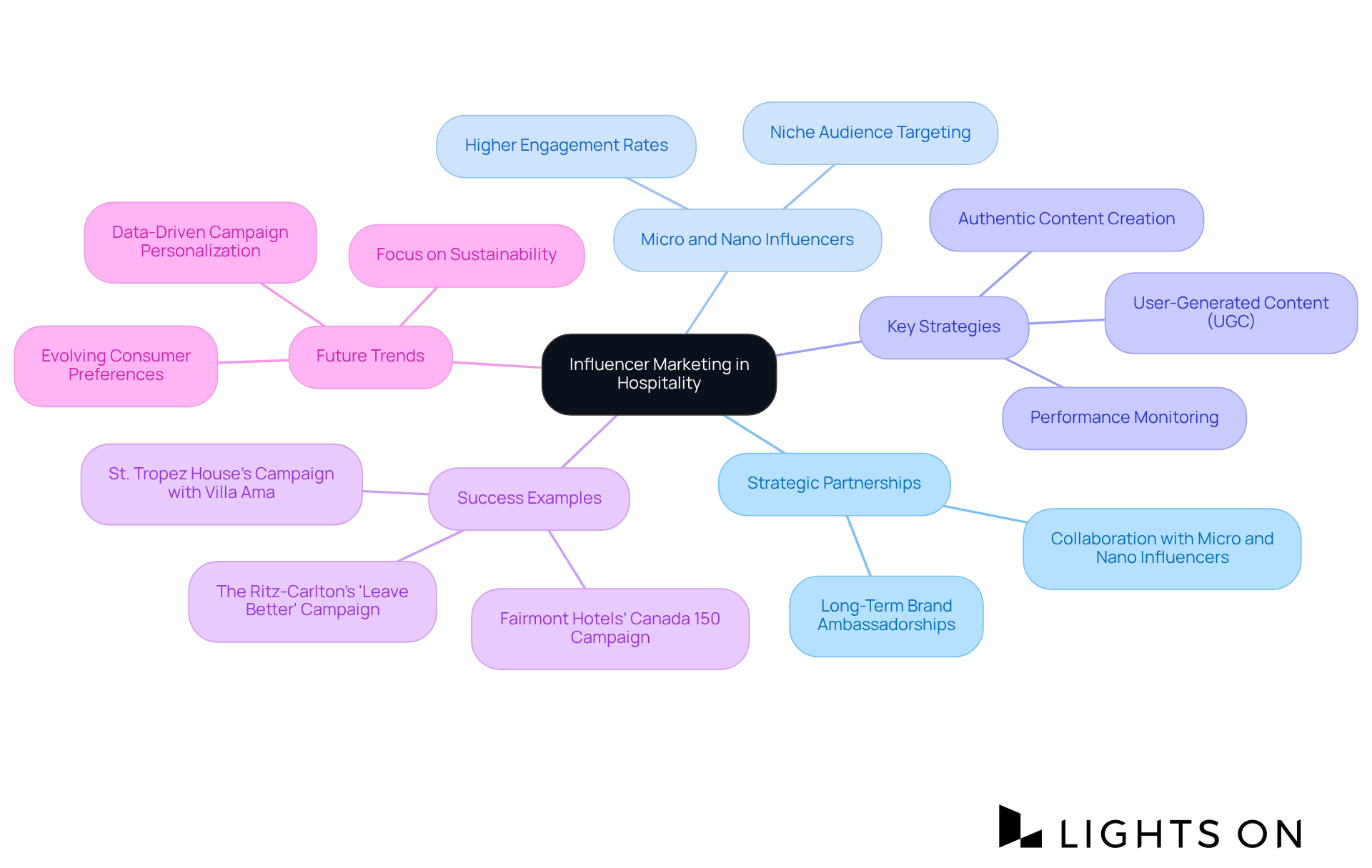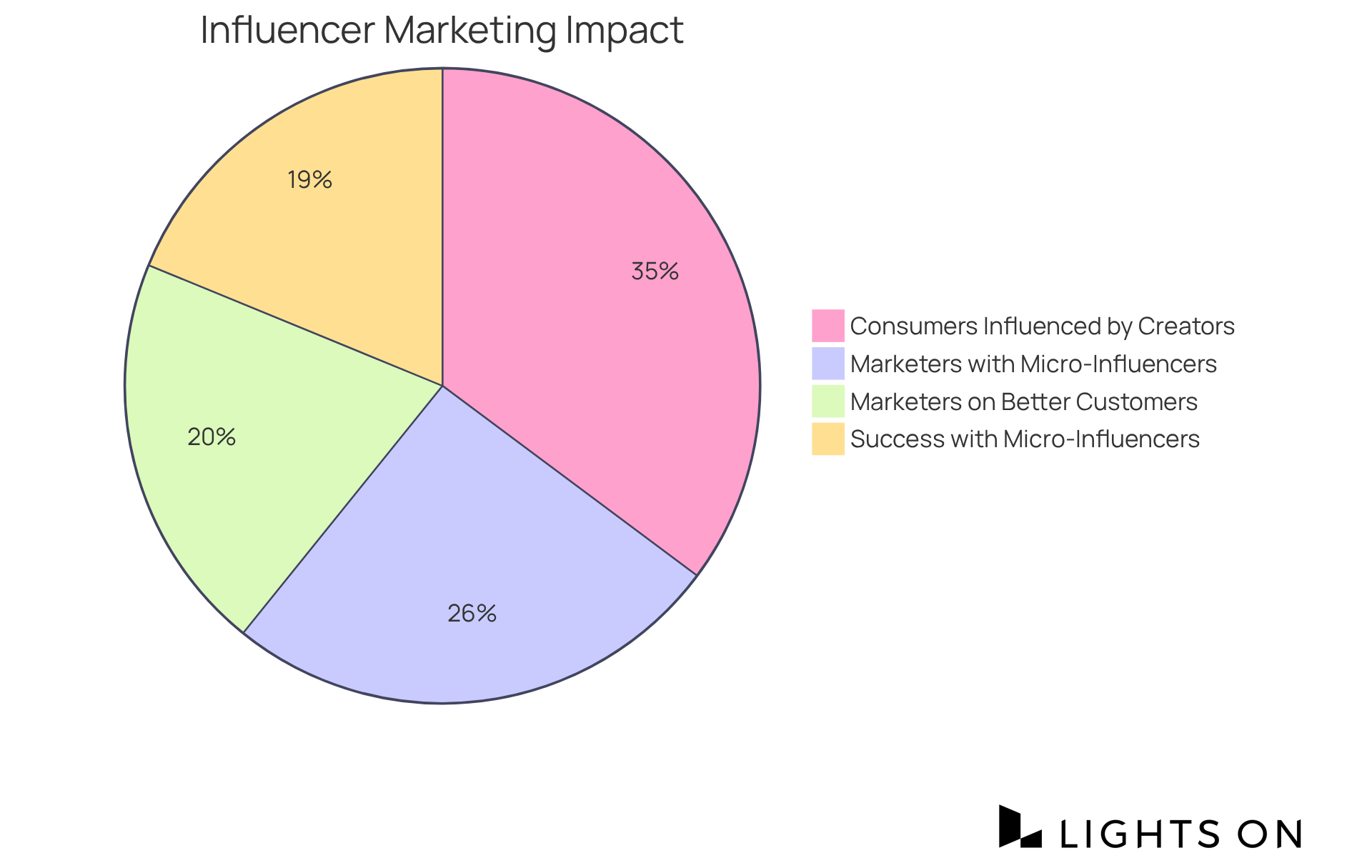The article centers on the strategic utilization of booking influencers to drive success within the hospitality industry. It underscores the critical role of collaborating with micro and nano influencers, crafting authentic campaigns, and evaluating performance through key metrics. These strategies are pivotal, as they result in heightened engagement and increased bookings. Ultimately, this approach illustrates the concrete advantages of influencer partnerships in hospitality marketing.
The hospitality industry is undergoing a transformative shift, as brands increasingly leverage influencer marketing to forge connections with potential guests. By establishing strategic partnerships with micro and nano influencers, hotels can harness authentic storytelling that resonates with niche audiences, ultimately driving bookings and enhancing brand loyalty.
However, amidst the multitude of influencers competing for attention, how can hospitality businesses discern the right collaborators and effectively measure the success of their campaigns? This guide delves into the art of mastering booking influencers, offering actionable strategies and insights to navigate this dynamic landscape with confidence.
Influencer marketing in hospitality focuses on strategic partnerships with individuals who possess a robust online presence and a dedicated following, effectively promoting hotels, restaurants, and related services through authentic content. This approach is increasingly effective, as recommendations from key figures are perceived as more trustworthy than traditional advertising methods. By 2025, the emphasis is shifting towards micro and nano influencers, who typically demonstrate higher engagement rates and cater to niche audiences. These content creators excel at producing that resonates deeply with their audience, rendering their endorsements particularly impactful. For hospitality enterprises aiming to enhance their promotional strategies, understanding this evolving landscape and incorporating a booking influencer is crucial for engaging prospective guests meaningfully.
To leverage booking influencers effectively, hotels should adopt three key strategies:
The trend towards micro-influencers is reinforced by their capacity to cultivate genuine connections with their audiences. Campaigns featuring these influencers frequently yield superior engagement metrics, as their followers are more inclined to trust their recommendations. Successful promotional campaigns in hotels and restaurants have shown that authenticity and relatability are key factors that drive consumer interest and the booking influencer. For example, the Fairmont Hotels’ Canada 150 campaign, which highlighted unique Canadian experiences through influencer collaborations, resulted in a 10% revenue increase and millions of impressions, exemplifying the tangible benefits of such partnerships.
As the hospitality sector adapts to these trends, harnessing the power of micro and nano advocates will be essential for crafting effective promotional strategies that resonate with today’s discerning travelers. Furthermore, hotels should consider nurturing long-term partnerships with key figures to foster trust and continuity in their marketing efforts. Incorporating user-generated content (UGC) will also enhance authenticity, while aligning with sustainability values can attract eco-conscious travelers. Finally, tracking metrics to evaluate the success of influencer partnerships will yield valuable insights into their effectiveness and return on investment, ultimately contributing to increased bookings and revenue through a booking influencer strategy.

To effectively recognize suitable promoters, begin by clearly defining your target demographic and the type of content that resonates with them. Leverage social media platforms such as Instagram, TikTok, and YouTube to identify personalities specializing in travel and hospitality content. Focus on individuals who exhibit a genuine connection with their followers, as indicated by high engagement rates—micro-influencers, for example, often foster better interaction due to their closer relationships with supporters. Tools like BuzzSumo and HypeAuditor can aid in , offering insights into their reach and audience demographics.
Once you compile a list of potential influencers, evaluate their past collaborations to ensure alignment with your brand's values and messaging. Successful partnerships hinge on authenticity; a 2023 Nielsen study revealed that 92% of consumers trust recommendations from social media personalities when they perceive them as genuine. Furthermore, consider the influencer's content quality and posting frequency, as consistent engagement is vital for sustaining audience interest. By selecting individuals who not only align with your brand but also connect with your target demographic, you can amplify your marketing efforts and foster meaningful engagement.

To effectively reach out to a booking influencer, begin by personalizing your message to reflect a genuine interest in their work. Engage with their content—like, comment, and share—to build rapport before initiating contact. Once a connection is established, propose a collaboration that clearly outlines mutual benefits. Specify your expectations regarding deliverables, timelines, and compensation to avoid misunderstandings. Offering complimentary stays or unique experiences in exchange for content creation can be particularly enticing.
Utilize outreach email templates to streamline your communication process, but ensure that each message feels personal and tailored to the individual's style. Statistics indicate that:
When , be transparent about your budget and what you can offer. Many successful campaigns involve booking influencers, such as micro-influencers, who often yield higher engagement rates and more authentic connections with their audiences. In fact:
This approach not only enhances visibility but also fosters trust, making it a valuable strategy for hospitality marketing.

To effectively measure the performance of your promotional campaigns, establishing clear key performance indicators (KPIs) prior to launching is crucial. Consider common metrics such as:
For instance, tracking engagement rates reveals how well your content resonates with viewers, while monitoring reach evaluates the overall visibility of your campaign. Utilizing tools like allows for monitoring referral traffic from promotional posts, providing insights into booking trends and customer behavior.
After the campaign concludes, it is essential to conduct a thorough analysis to assess which strategies were successful and identify areas needing improvement. Gathering feedback from a booking influencer can yield valuable insights into audience perceptions and engagement. Ongoing optimization, grounded in these data insights, is vital for enhancing the efficiency of your promotional initiatives.
For hotels, specific KPIs may include:
Notably, a campaign for a hotel in Quebec generated over $15,000 CAD in sales within 24 hours, illustrating the potential ROI for hotels. Furthermore, a 2023 study found that 92% of consumers rely on recommendations from social media personalities when they appear genuine, underscoring the significance of authenticity in this type of promotion. By focusing on these metrics, hotels can refine their promotional strategies, ensuring alignment with marketing objectives and effective engagement with their target audience. Additionally, a report indicated that 65% of enterprise marketers consider ROI tracking the most critical aspect of booking influencer collaborations, highlighting the importance of measuring success.

Influencer marketing has emerged as a pivotal strategy for the hospitality industry, enabling hotels and restaurants to connect authentically with potential guests through trusted voices. By leveraging the unique strengths of micro and nano influencers, hospitality businesses can craft impactful campaigns that resonate deeply with niche audiences, ultimately driving engagement and bookings.
Throughout this discussion, key strategies for successfully integrating booking influencers into marketing efforts have been highlighted. Identifying the right influencers, nurturing genuine relationships, and measuring campaign performance are essential steps in this process. The emphasis on authenticity, as demonstrated by successful case studies, underscores the tangible benefits derived from well-executed influencer collaborations. Furthermore, employing data-driven insights to optimize these partnerships can significantly enhance overall marketing effectiveness.
As the hospitality landscape continues to evolve, embracing influencer marketing is not merely an option but a necessity for remaining competitive. It is vital for hospitality brands to proactively adapt to these trends, foster long-term relationships with influencers, and continuously refine their strategies based on performance metrics. By doing so, businesses can not only enhance their visibility but also cultivate trust and loyalty among discerning travelers, ultimately leading to increased bookings and sustained success in the industry.
What is influencer marketing in hospitality?
Influencer marketing in hospitality involves strategic partnerships with individuals who have a strong online presence and dedicated following, promoting hotels, restaurants, and related services through authentic content.
Why is influencer marketing considered more effective than traditional advertising?
Recommendations from key figures in influencer marketing are perceived as more trustworthy than traditional advertising methods, leading to higher engagement and credibility.
What types of influencers are becoming more prominent in hospitality marketing?
The trend is shifting towards micro and nano influencers, who typically have higher engagement rates and cater to niche audiences, making their endorsements particularly impactful.
What strategies should hotels adopt to leverage booking influencers effectively?
Hotels should identify and collaborate with micro and nano influencers that align with their brand, develop engaging campaigns that inspire authentic sharing of experiences, and monitor the performance of influencer partnerships to assess their impact on bookings.
What benefits have been observed from successful influencer campaigns in hospitality?
Campaigns featuring micro and nano influencers often yield superior engagement metrics and can lead to tangible benefits, such as increased revenue and impressions, as demonstrated by Fairmont Hotels’ Canada 150 campaign, which resulted in a 10% revenue increase.
How can hotels foster long-term relationships with influencers?
Hotels should consider nurturing long-term partnerships with key influencers to build trust and continuity in their marketing efforts, enhancing the effectiveness of their promotional strategies.
What role does user-generated content (UGC) play in influencer marketing?
Incorporating user-generated content enhances authenticity in marketing efforts, making the promotions more relatable and trustworthy for potential guests.
How can hotels attract eco-conscious travelers through influencer marketing?
Aligning influencer partnerships with sustainability values can help attract eco-conscious travelers, making the marketing efforts more appealing to this demographic.
Why is tracking metrics important in influencer marketing?
Tracking metrics allows hotels to evaluate the success of influencer partnerships, providing valuable insights into their effectiveness and return on investment, ultimately contributing to increased bookings and revenue.
Transform your group booking strategies with Lights On and watch your occupancy soar.